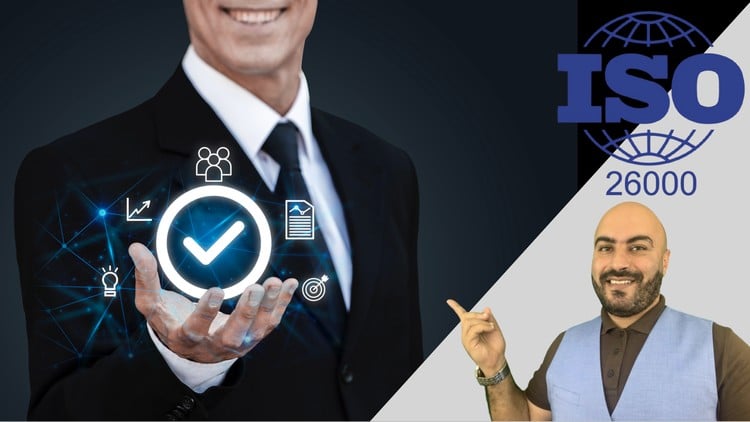
Pathways to Corporate Social Responsibility Beyond Profit!
Why take this course?
The ISO 26000 Master Class: Empowering Ethical Leadership 🌍🎓
Course Instructor: Sameh Elsayed
- An internationally recognized expert in the field of social responsibility and ethical leadership.
Headline: Pathways to Social Responsibility Beyond Profit!
Introduction to ISO 26000
- Discover the principles of one of the world’s most influential standards on social responsibility.
- Learn how ISO 26000 can transform your organization’s approach to corporate social responsibility (CSR).
Why ISO 26000?
ISO 26000 serves as a comprehensive guide for any organization looking to:
- Enhance its reputation and stakeholder confidence.
- Strengthen relationships with customers, governments, and local communities.
- Contribute significantly to sustainable development goals.
The ISO 26000 Framework 🔖
Dive into the seven core subjects of social responsibility, which are:
- Governance – Ensuring responsible decision-making and accountability within your organization.
- Human Rights – Promoting respect for human rights throughout your supply chain.
- Labor Practices – Encouraging fair labor conditions, diversity, and job security.
- Environmental Protection – Committing to sustainable use of resources and minimizing environmental impact.
- Fair Operating Practices – Establishing ethical conducts in your business operations.
- Consumer Issues – Enhancing consumer trust by ensuring product safety and customer satisfaction.
- Community Involvement & Development – Actively engaging with communities to foster positive social outcomes.
Key Benefits of ISO 26000
- Ethical Leadership: Learn how to lead by example, fostering a culture of integrity and ethical conduct.
- Stakeholder Engagement: Understand the importance of engaging with stakeholders effectively.
- Risk Management: Achieve responsible governance and effective compliance management.
- Brand Differentiation: Stand out in the marketplace by demonstrating your commitment to social responsibility.
Integration with Global Goals 🌐
- Learn how ISO 26000 aligns with globally-recognized frameworks such as the United Nations Sustainable Development Goals (SDGs).
- Understand the role of your organization in achieving a more sustainable and equitable world.
Course Outcomes
By the end of this course, you will:
Note➛ Make sure your 𝐔𝐝𝐞𝐦𝐲 cart has only this course you're going to enroll it now, Remove all other courses from the 𝐔𝐝𝐞𝐦𝐲 cart before Enrolling!
- 🛠️ Understand the ISO 26000 framework and how to apply it within your organization.
- 🤝 Be equipped with strategies for fostering ethical leadership and promoting sustainable development.
- 📈 Know how to measure and communicate the impact of your social responsibility initiatives.
- 🌍 Contribute to global goals by aligning your organization’s activities with international standards for social responsibility.
Your Pathway to Social Responsibility
Join us on this journey to elevate corporate social responsibility to new heights. Embrace the challenges and reap the rewards that come with being an ethical leader in today’s global marketplace. Enroll now and take your first step towards a more sustainable and responsible future!
Enhance Your Organization’s Social Responsibility Today 🌟
- With “The ISO 26000 Master Class: Empowering Ethical Leadership,” you’re not just learning about social responsibility; you’re setting the stage for your organization to become a beacon of ethical practices and sustainable development. Sign up now!
Add-On Information:
- Master ISO 26000 Fundamentals: Gain a deep understanding of ISO 26000 as a global guidance standard for social responsibility, moving beyond basic compliance.
- Strategic CSR Integration: Learn to embed social responsibility into your core strategy, aligning business goals with sustainable, ethical practices for lasting value.
- Empower Ethical Decision-Making: Develop frameworks for principled choices, fostering integrity and accountability to navigate complex ethical dilemmas effectively.
- Advanced Stakeholder Engagement: Acquire techniques to effectively identify, prioritize, and engage diverse stakeholders, building trust across your entire ecosystem.
- Uphold Human Rights & Labour: Understand and implement policies ensuring dignity, equity, and safe global working conditions, adhering to human rights principles.
- Drive Environmental Stewardship: Explore actionable strategies for minimizing environmental impact, promoting resource efficiency, and contributing to ecological sustainability.
- Practice Fair Operating Principles: Grasp anti-corruption, fair competition, and responsible political engagement, establishing transparent ethical procedures to mitigate risks.
- Ensure Responsible Consumer Care: Master ethical product development, marketing, and customer relations, prioritizing transparency, privacy, and consumer well-being.
- Foster Community Development: Discover impactful ways to positively contribute to local communities, addressing societal challenges collaboratively where you operate.
- Strengthen Ethical Governance: Enhance governance structures to champion social responsibility, ensuring leadership commitment and effective oversight for ethical performance.
- Measure & Report Social Impact: Learn to effectively measure, evaluate, and transparently report social responsibility performance, demonstrating progress and accountability.
- Cultivate an Ethical Culture: Gain practical tools to embed ethical conduct throughout your organization, fostering shared values and principled employee contribution.
- PROS:
- Global Credibility: Align your organization with a globally recognized social responsibility framework, enhancing reputation and trust.
- Enhanced Risk Management: Proactively identify and mitigate social/environmental risks, safeguarding against reputational damage.
- Attract & Retain Talent: Become an employer of choice, appealing to values-driven professionals through genuine ethical commitment.
- Innovation & Efficiency: Discover new business models and operational efficiencies through a social responsibility lens.
- CONS:
- Implementation Complexity: Integrating ISO 26000’s guidance can be resource-intensive, requiring significant organizational change and potentially slower adoption.
English
language